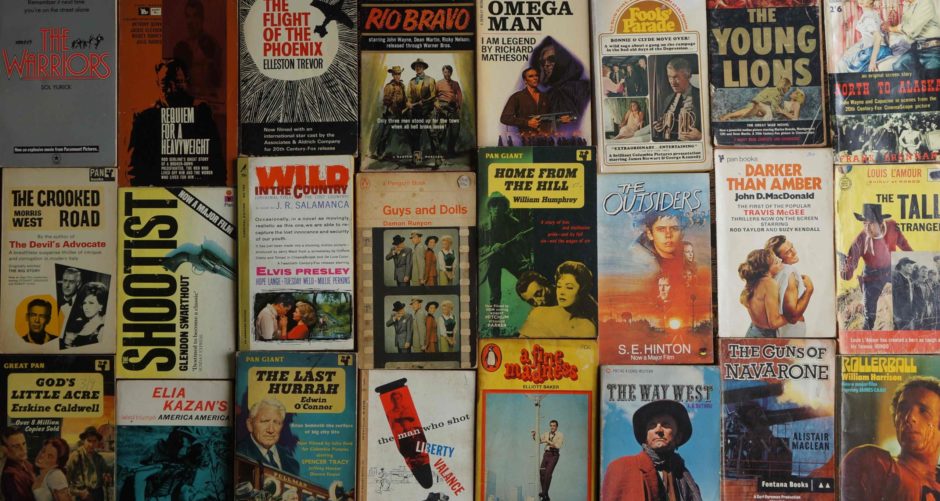FILM DIRECTOR: Andrew Sinclair
SCREENWRITER: Andrew Sinclair
FILM STARS: Richard Burton, Elizabeth Taylor, Peter O’Toole, Siân Phillips, Glynis Johns, Vivien Merchant, Victor Spinetti, Ryan Davies, Angharad Rees, Ray Smith, Michael Forrest, Ann Beach, Glynn Edwards, Bridget Turner, Talfryn Thomas, Tim Wylton, Bronwen Williams, Meg Wynn Owen, Hubert Rees, Aubrey Richards, Mark Jones, Dillwyn Owen, Richard Davies, David Jason, Davyd Harries, David Davies, Paul Grist, Ruth Madoc, Susan Penhaligon
COUNTRY: England
THIS BOOK
AUTHOR: Dylan Thomas
TYPE: Play
PUBLISHER: Aldine
THIS EDITION PUBLISHED: 1972
COUNTRY: Great Britain
COVER: Paperback
THE ORIGINAL BOOK
ORIGINAL AUTHOR: As Above
YEAR FIRST PUBLISHED: 1954
ORIGINAL BOOK TITLE: The film title
NOTES
GENRE: Drama
WORDS: Dylan Thomas’s “play for voices” Under Milk Wood was a radio play (which grew from ideas, conversations and unfinished or aborted projects) which was given its world premiere in January 1954, a few weeks after his premature death, with Thomas’s friend Richard Burton as narrator. It has since been turned into a record, a stage play, an opera, a ballet, a jazz album and this 1972 film.
The (radio) play is a Welsh classic (though written and spoken in Welsh English). I have not read the (sort of) play and I’m not sure I will. Thomas writes in Welsh English and his words are thick with description and run almost like a stream of consciousness. I suspect Thomas gets his inspiration from Irishman Joyce who wrote in English in an equally mischievous way, and I’m not sure I would read Joyce either. Who knows.
Having said that I have listened to the (1954) Under Milkwood radio broadcast on LP record with Burton whilst following the play along from time to time. Like an early version of an audio book. So, I have read it … sort of. Are audio books “reading”?
The play takes in a day in the life of a small, Welsh fishing village called “Llareggub” (“buggerall” backwards) as seen through “ghosts” of the citizens as they sleep. The narrator (First Voice/Second Voice) informs the audience that they are witnessing the townspeople’s dreams. There are many characters in the town and almost all of the characters in the play are introduced as the audience witnesses a moment of their dreams. The beauty of this is the play can move forward, backwards and sideways and create a vivid cast of characters that populate this small Welsh seaside town.
The film is directed by novelist, academic, biographer, historian and occasional cineaste Andrew Sinclair. It’s a labour of love (Sinclair also wrote the screenplay, as he did with the other two films he directed) and is quite beautiful in it’s images. Actually very beautiful and reminiscent of director John Ford (which may not be surprising as Sinclair wrote a biography on Ford, “John Ford: a Biography” in 1979). But, the film overall is pretty dull. Richard Burton is the narrator as he was in the narrated and I love Burton and the tone of his voice and could listen to him reading the, oft referred to, telephone directory. He loves Dylan Thomas (and all things Welsh) and so takes even more care than usual in his role of narrator character. The trouble is , inevitably, the film shows what the words describe. You are doubling up on the same imagery. And, that is tiring. A pity because the cast is good. Burton is great, O’Toole is always good even when “acting” as he is here, and Elizabeth Taylor (still married to Burton here and one of 11 films she made with him) is fun. The rest of the cast is (mainly / largely) Welsh and are authentic (and familiar from many supporting roles in English films). But, they do just seem to act out the evocative words.
LINKS
TRAILER
The 1954 radio play:
https://www.youtube.com/watch?v=7ZXhPYTX1BY



yep re Kirk … no one pushes Kirk around. His Bryna Production Company was involved with (partially funded) POG ..and…